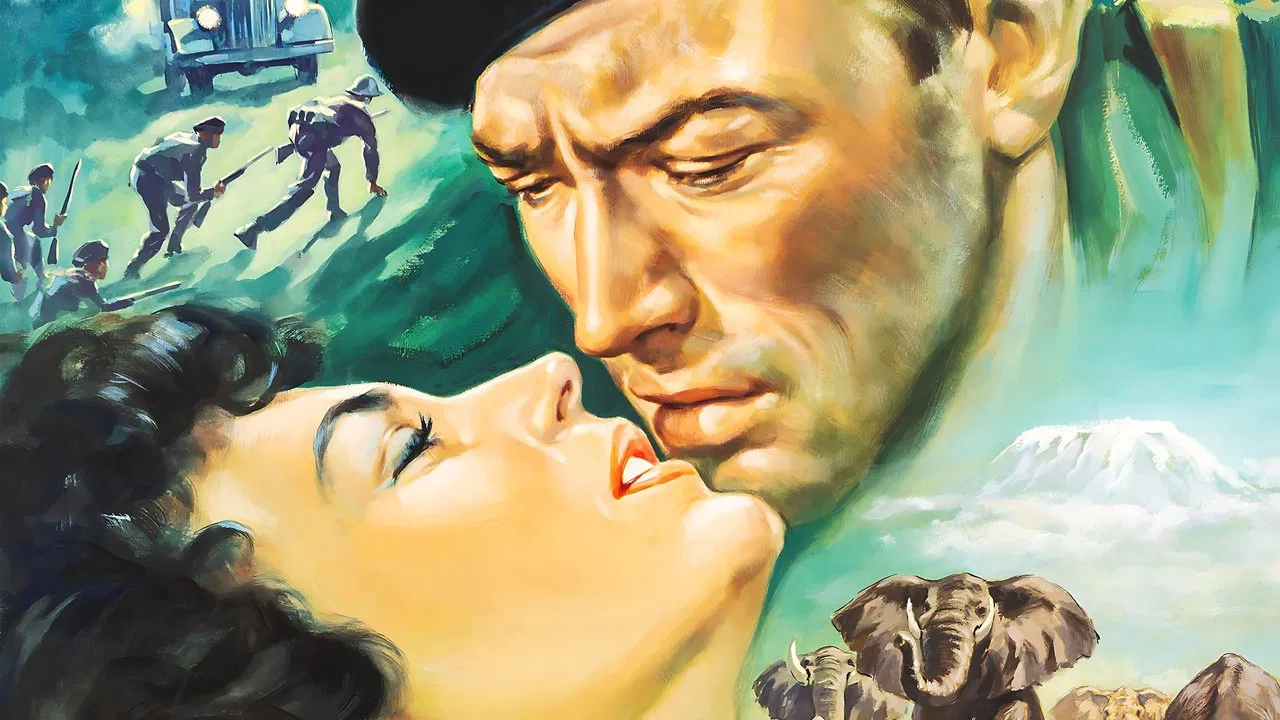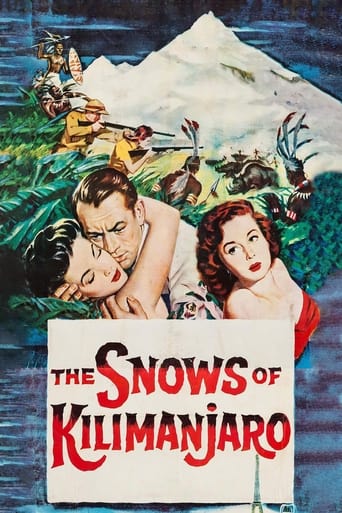

Sorry, this movie sucks
... View MoreVery interesting film. Was caught on the premise when seeing the trailer but unsure as to what the outcome would be for the showing. As it turns out, it was a very good film.
... View MoreIf you're interested in the topic at hand, you should just watch it and judge yourself because the reviews have gone very biased by people that didn't even watch it and just hate (or love) the creator. I liked it, it was well written, narrated, and directed and it was about a topic that interests me.
... View MoreA great movie, one of the best of this year. There was a bit of confusion at one point in the plot, but nothing serious.
... View MoreGood heavens, this movie is boring! I don't know what was wrong with screenwriter Casey Robinson, or the people who read his script and didn't suggest a serious edit or rewrite, but if you can make it through this two hour film without nodding off, you deserve a medal. I couldn't.Gregory Peck is wounded, and the entire movie flashes back and forth between him being nursed by Susan Hayward and his reflections of his romance with Ava Gardner. Susan Hayward is one of my all-time favorite actresses, so if a movie of hers is terrible, there has to be a reason. I blame the screenplay, but you can blame Ernest Hemingway's original story if you like. Greg is written to be a wishy-washy, selfish, and annoying. It's tough to imagine Gregory Peck being unlikable, but believe me, he is in this movie. Even though he's wounded and sometimes delirious, he's just unlikable. I found myself wanting Susan Hayward to give up on him and let him fester.I realize Ava Gardner was a sex symbol, and that both on and off screen, men couldn't keep their hands off her, but I never understood why. I never found her appealing, so I didn't know why Greg kept dreaming of her when he had Susan Hayward sitting right next to him! If you want to see Greg and Ava, watch The Great Sinner instead. And if you want to see Greg and Susan, watch David and Bathsheba instead. There's really no reason to watch this one, unless you misplaced your sleeping pills.
... View MoreWriter Harry Street (Gregory Peck) lies injured with an infected wound on his leg in the shadow of Mount Kilamanjaro. He awaits for help with his wife Helen (Susan Hayward) by his side as he recalls his past failings and his first love Cynthia Green (Ava Gardner).This was nominated for Best Cinematography for that year. Certainly the widelife filming looks great. With the great actors involved, I had hoped for better. Peck and Hayward have a tough time establishing chemistry. They are in Africa with Peck dying. He's an angry drunk much in keeping with the Ernest Hemingway type character. It's a little bit against type of his usual nice guy persona. They fight more than they show affection. Peck and Hayward's story all happened in the past. All of it moves very slowly. The movie is very static and stiff. It's lucky for the movie that the characters are played by such giant stars. If they shone less brightly, this would truly be not worthwhile at all. As it is, it's nice to see these 3 stars in one movie no matter how good or bad it is.
... View MoreA man gets caught between Susan Hayward and Ava Gardner in this adaptation of Ernest Hemingway's novel by 20th Century Fox. There are, to be sure, greater problems in the world than having to choose between Miss Hayward and Miss Gardner. Though personally this writer thinks that Ava Gardner would win the coin toss each time in real life.Mr. Peck plays the Hemingway protagonist (a stand-in for Hemingway himself) with just the right combination of ease and dis-ease. There are some good outdoor hunting scenes, and through it all, Peck is perfectly groomed and dressed. Perhaps Cary Grant's tailor joined the hunting expedition.
... View MoreI'm ashamed to admit it, but I've never read Ernest Hemingway, I saw film adaptations, I'm familiar with Hemingway's tumultuous and adventurous life, his body of work, his monumental legacy on the field of literature, and it's out of respect to the writer, and to the Man, with a major M, that I start this review with a confession. If there is one thing I learned from Hemingway, and which "The Snows of Kilimanjaro" clearly states, is that no one should speak about what he doesn't know. I could use Wikipedia to establish some parallels between Gregory Peck's character as novelist Harry Street and Ernest Hemingway, about all the biographical elements of the story, but how could that ever replace the 'reading' experience?I've never been such a purist and if I had to read all the books before their adaptations, it would never end. But now, it fits both the author's and the film's spirits, which is that writing is not a profession, it's a condition, a choice a man makes to be the privileged witness of his world and sharing it with passion, understanding and humanism. You can call it 'existentialism', it might be even simpler than that, let's just call it honesty and sincerity. No one who hasn't faced the atrocities of war can ever write about death, no one who has ever lived an unfulfilled passion can write about love; no one who hasn't been jailed can write about freedom, no one who hasn't traveled around the world can ever give a universal dimension to his oeuvre. And when Harry decides to become a writer, the only encouragement he gets from his Uncle Bill (superbly portrayed by Leo G. Carroll) is a shotgun, to go hunting. It's only in hunting that a man can find the meanings of life and death, of danger and heroism, they don't mean anything special when you got them, but their lack is hugely insufferable. This is why 'Hunting' is what a writer's life should be in microcosm, a sort of quest to find a meaning that might never be given, a thirst to discover every place in the world, to challenge life and succumb to any of its temptations: drinks, women, lust without abandoning such male virtues as courage and responsibility, before finally extracting from experiences stories' raw material. And the film opens with Harry's voice-over exposing what is perhaps the greatest enigma of life: "Kilimanjaro is a snow-covered mountain 19,710 feet high, and is said to be the highest mountain in Africa. Close to the western summit there is the dried and frozen carcass of a leopard. No one has explained what the leopard was seeking at that altitude."Thankfully, we never get the explanation. The riddle is only a metaphor about finding our own truth, by reaching the ultimate limit of our efforts. And as the movie opens, we find Harris, suffering from a thorn prick, his infected leg attracting both vultures and hyenas. The disillusioned Harris, with his girlfriend Helen played by Susan Hayward, contemplates what seems to be a true failure, for his efforts never allowed him to become the accomplished writer he dreamed to be, the 'leopard in the summit'.For the sake of adventures, he abandoned the premise of family life with Cynthia Nixon, played by Ava Gardner in a performance all in sensitivity and emotion, contrasting with her adventurous and wisecracking attitude in "Mogambo". And after Cynthia, it's a cold but sexy European rich lady who introduced him to all the artistic European elite, anyway, Harris obviously lost his track and tried to find it out by reaching Cynthia who became an inaccessible Holy Grail, replacing an unclear dream, but ironically guiding him to a perilous trip during Spain's Civil War, before meeting Helen in Paris, the setting of his romance with Cynthia.Peck's performance is wooden and deliberately cynical, like a man who doesn't think much of himself, but it succeeds in embodying the tragedy of someone who never exactly knew himself, where he stood for, and perhaps, that is the worst failure an adventurer writer can ever make: becoming an intellectual malcontent. On his deathbed, his Uncle doesn't talk much about hunting but rather leaves him the Kilimanjaro riddle, implicitly acknowledging that it's up to each one of us to meet with our destiny, and to understand our world, according to our own sensitivity. "The Snows of Kilimandjaro" raise very important question that might hit sensitive chords in the hearts of wannabe artists, but it also helps to embrace life in a more mature way, what is it that we seek: success? money? Harris got them but he lost self-respect. Love and passion? Sometimes, they can undermine the very road to destiny, but lacking them is even worse. We all have to find out the remedy of our own existential malaise and pray for that they wouldn't be worse than the evil.On a more personal level, I learned from the film that only experience forges conscience and only conscience can guide the words the closest to truth. I love to write, but I never wrote anything significant in my life, however, I've never wrote as well as when I narrated my trip to the Toubkal, which is the second highest mountain in Africa. I could describe the effect the wind had on my eyes, the sensation of feet being mired into the freezing snow, and the exhilaration of being on the top of the mountain. I could because I lived it, and no one could get that experience off me.And oddly enough it was before I ever knew about that riddle, that I concluded the story with a quote from another significant author of XXthe century, Khalil Jibran who seemed to have his own answer to the Kilmanjaro riddle and to life." when you have reached the mountain top, then you shall begin to climb"
... View More